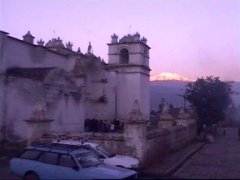 Continuation of "A TRANSLATION MEMOIR: 45 YEARS WITH CESAR VALLEJO"
Continuation of "A TRANSLATION MEMOIR: 45 YEARS WITH CESAR VALLEJO"Dr. Clayton Eshleman
When we returned to the States in the spring of 1966 and moved to New York City, Grove Press expressed interest in the translation. I prepared a seventh draft, and after having it checked by readers, Dick Seaver, then the senior editor at Grove, offered me a contract—contingent upon Mme. Vallejo’s signature. I wrote to Maureen and asked her if there was anything she could do. She offered to go and meet Georgette. Over the next six months, Maureen must have seen Georgette almost weekly and she did this while taking care of her kids, teaching fulltime, battling illness and trying to save a floundering marriage.
Seaver was now sending letter after letter to Mme. Vallejo trying to convince her that the translation Grove wished to publish was not the one I had sent her from Bloomington in 1964. Maureen and her husband Johnny were inviting her out to the farm for holiday weekends. Since Seaver was getting nowhere, Maureen eventually had to mention that she was a friend of mine and that she had worked on the translation. Georgette protested that she had been betrayed and once again it looked as if everything was off. But Maureen kept after her and one day, Americo Ferrari, a Peruvian scholar who had written on Vallejo (and worked with Georgette on her French edition of Vallejo’s poetry), appeared in the Grove offices and told Seaver that Mme. Vallejo had asked him to check the translation. Apparently he wrote her that it was publishable, for a week or so later, she wrote Seaver that she would sign a contract if Grove would include the following clause: when and if she found a better one, Grove must destroy mine and publish the other one. Seaver told me that he had had it with her. So I wrote Maureen that unless a signed contract appeared within a month, the whole project would be off. Maureen continued to plead with her. One day Georgette said that if Johnny would type up the contract she wanted, she would sign it. He did, she signed it, and a couple of weeks later Seaver called me and said that while it was not their contract, Grove found it acceptable and their lawyer had determined it was legal. He wrote Mme. Vallejo, enclosing her part of the advance. Subsequently, Maureen wrote that Georgette had called her up, extremely upset, saying that she thought the contract Johnny had typed up was “only a gesture,” and that she had signed it so that Maureen would not be “upset,” and that she had never intended, at any point, to sign a legal contract! Grove went ahead and Human Poems was published in the spring of 1968.
In 1970, I took a job at the new California Institute of the Arts outside of Los Angeles, and my present wife Caryl and I moved to the San Fernando Valley. I had done a little work on Vallejo’s sheaf of poems on the Spanish Civil War (written in 1937 and 1938, while he was working on Poemas humanos) in the mid-1960s, and after making a new draft of a translation of Espana, aparte de mi este caliz, I once again found myself looking for someone to check it with. I was introduced to Jose Rubia Barcia, a Spanish poet and essayist, in exile since the Spanish Civil War, who had been teaching at UCLA for years. While going over the draft with Barcia, I was so impressed with his honesty, scrupulosity and literary intelligence, that I suggested we work together as co-translators. We completed a translation of Spain, Take this Cup from Me and Grove Press published it in 1974.
| <<Page 4 | >>Page 6 | ||||||||||||||||||||||||||||||||||||||||||||||||||||||||||||||||||||||||||||||||||||||||||||||||||||||||||||||||||||||||||||||||||||||||||||||||||||||